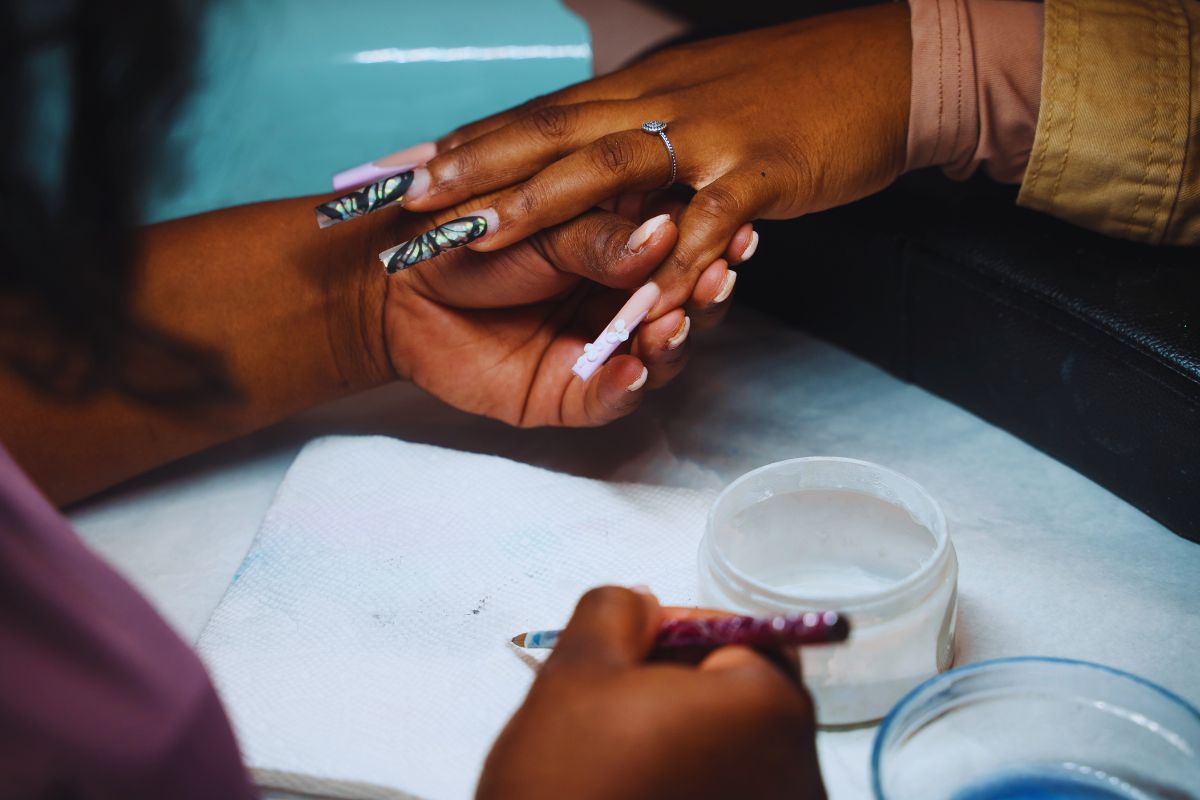What Can I Use Instead of Acrylic Nails? 10 Best Substitutes

Published July 3, 2025
Acrylic nails have long been a go-to option for extending and beautifying nails. However, they come with their own set of challenges, including a reliance on harsh chemicals, potentially damaging effects on natural nails, and difficulties for those with allergies or sensitivities.
Fortunately, there are plenty of substitutes for acrylic nails that are both healthier and equally stylish. This guide explores the best alternatives for those looking to switch up their manicure game while minimizing damage and exposure to harmful ingredients.
What Are Acrylic Nails?
Acrylic nails are artificial nail enhancements created by combining a powder polymer with a liquid monomer, forming a thick paste that hardens into a durable nail coating. While acrylic nails are incredibly strong and long-lasting, they require significant maintenance and can weaken natural nails over time. Their application process also involves chemicals that may trigger allergies or irritate sensitive skin.
Challenges With Acrylic Nails
- Harsh Chemicals: Acrylic nails often contain chemicals like methyl methacrylate (MMA), which can irritate the skin or lungs during application or removal.
- Nail Damage: Prolonged use of acrylic nails can lead to thinning or brittleness of the natural nail.
- High Maintenance Costs: Between regular fills and occasional repairs, acrylic nails demand consistent upkeep that can be expensive.
- Potential Allergies: Many individuals are allergic to the chemicals found in acrylic products.
- Removal Issues: Removing acrylic nails often involves acetone, which can dry out nails
Best Alternatives to Acrylic Nails
Below, we’ll explore the most popular acrylic nail alternatives and their unique benefits, along with tips on selecting what works best for your needs.
1. Gel Nail Extensions
If you’re looking for a natural-feeling and healthier option, gel nail extensions are an excellent alternative to acrylic nails. Made with builder gel, these nails are lighter and softer than acrylics and require fewer harsh chemicals.
Advantages:
- More flexible than acrylic, reducing pressure on natural nails.
- Cured under a UV or LED lamp, eliminating the need for monomer.
- Long-lasting and durable, typically up to 3-4 weeks.
Ideal For:
Those seeking a durable option that’s gentle on the nail bed.
2. Dip Powder Nails
Dip powder nails are another substitute for acrylic nails, offering a strong yet lightweight finish. The process involves dipping nails into a colored powder and sealing it with a clear topcoat.
Advantages:
- Faster application compared to acrylics.
- Fortified with nutrients like calcium and vitamins for healthier nails.
- Can last up to four weeks without chipping.
Ideal For:
Anyone who wants a durable, chemical-limited manicure option with easy application.
3. Press-On Nails
Modern press-on nails are far from the flimsy versions of the past. They now come in durable and customizable designs to suit any style.
Advantages:
- Quick and easy application that doesn’t require monomer or acetone.
- Can be reused multiple times, making them a cost-effective option.
- Minimal exposure to harmful chemicals.
Ideal For:
Anyone looking for a no-fuss, budget-friendly alternative to acrylic nails can apply them at home.
4. Silk Wraps
Silk wraps involve securing a thin layer of silk fabric to the natural nail and sealing it with resin. They are ideal for repairing broken nails or creating a transparent, glossy look.
Advantages:
- Gentle on natural nails; perfect for repairing cracks or chips.
- Lightweight and easy to remove.
- Creates a natural, polished appearance.
Ideal For:
Those with weak or fragile nails who want to strengthen them without heavy enhancements.
5. Fiberglass Nails
Fiberglass nails use small mesh-like fibers to create strong yet natural-looking nail enhancements. They’re applied similarly to silk wraps and build strength without harsh chemicals.
Advantages:
- Flexible and malleable, minimizing stress on the natural nail.
- Transparent finish for a sleek, natural look.
- Less prone to damage compared to acrylics.
Ideal For:
People with short or brittle nails are looking for reinforcement without harsh treatments.
6. Gel Nail Polishes
Gel nail polish is a fantastic alternative to acrylic nails, offering long-lasting color with minimal maintenance. Applied like regular nail polish and cured under UV light, gel polish provides extra durability.
Advantages:
- Lasts for up to three weeks without chipping.
- Applied quickly with significantly less wear-and-tear on natural nails.
- Available in a wide range of colors and finishes.
Ideal For:
Anyone wanting professional-looking nails without the commitment of extensions or enhancements.

7. Nail Stickers and Strips
Nail stickers, also known as wraps or polish strips, are pre-designed adhesives that adhere to the natural nail. They are a fun and affordable way to achieve intricate designs.
Advantages:
- No need for monomer or acetone.
- Easy to apply and highly budget-friendly.
- Perfect for DIY nail art enthusiasts.
Ideal For:
People on a tight budget or anyone wanting an effortless way to apply trendy nail art.
8. Solar Nails
A combination of acrylic and gel ingredients, solar nails are known for their clear, glossy finish. They don’t require UV curing and are more resistant to discoloration compared to traditional acrylics.
Advantages:
- Can last up to six weeks with proper care.
- Easier to remove than standard acrylic nails.
- Durable and resistant to breakage.
Ideal For:
Individuals seeking long-lasting, low-maintenance nails.
9. Acrylic Liquid Alternatives for DIYers
If you’re determined to use acrylic powder but need a substitute for traditional monomer, here are some alternatives to consider:
- Rubbing Alcohol: Acts as a simple, quick-drying substitute but may be drying to the nails.
- Dip Powder Activators: Designed to bond powder to the natural nail without requiring monomer.
- Acrylic Gel: Offers a thicker consistency and is often used in hybrid systems.
Note: While these substitutes are functional, they may not provide the same durability as professional-grade monomer.
10. What Can I Use Instead of Acetone to Remove Acrylic Nails?
If you’re looking for a gentler alternative to using acetone for nail removal, try the following options:
- Warm Water and Soap: Softens nails for gradual, manual removal.
- Rubbing Alcohol: Loosens adhesive bonds for easier removal.
- Cuticle Oil and Foil Wrap: Works as a moisturizing solution for releasing acrylic bonds.
These methods are kinder to the skin and nails but may take longer than acetone-based removal.
Choosing the Right Option
Selecting the best alternative to acrylic nails depends on your lifestyle, nail health, and personal preferences. If you’re prone to allergies, consider materials like dip powder activators and silk wraps, which minimize chemical exposure. For those with weak nails, options like fiberglass or UV-free gel extensions can provide lightweight reinforcement.
Lease Salon Space In Royal Palm Beach Florida
Fulfill your dreams and be your own boss when you lease salon space in Palm Beach Florida with us. Our beautiful salon spaces come with complimentary laundry and cleaning services and a flexible lease agreement you can afford. Our salon suites come with many amenities including free cleaning service, televisions, storage space, and more. Contact us now to book a tour or learn more.

Fact Checked By Experts
Our team of internal experts diligently fact-checked this content to ensure accuracy and reliability. Find detailed information about the rigorous editorial standards we uphold for our website.

About The Author
Meet Rei Bayucca: a versatile and seasoned writer who has ventured through diverse fields. With a passion for producing insightful and meticulously-crafted pieces, she aims to promote enlightenment and engagement among her readers.




